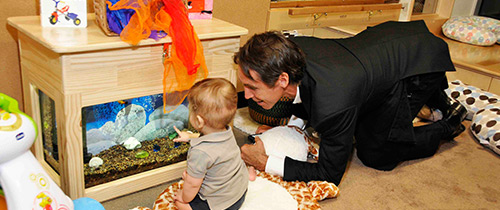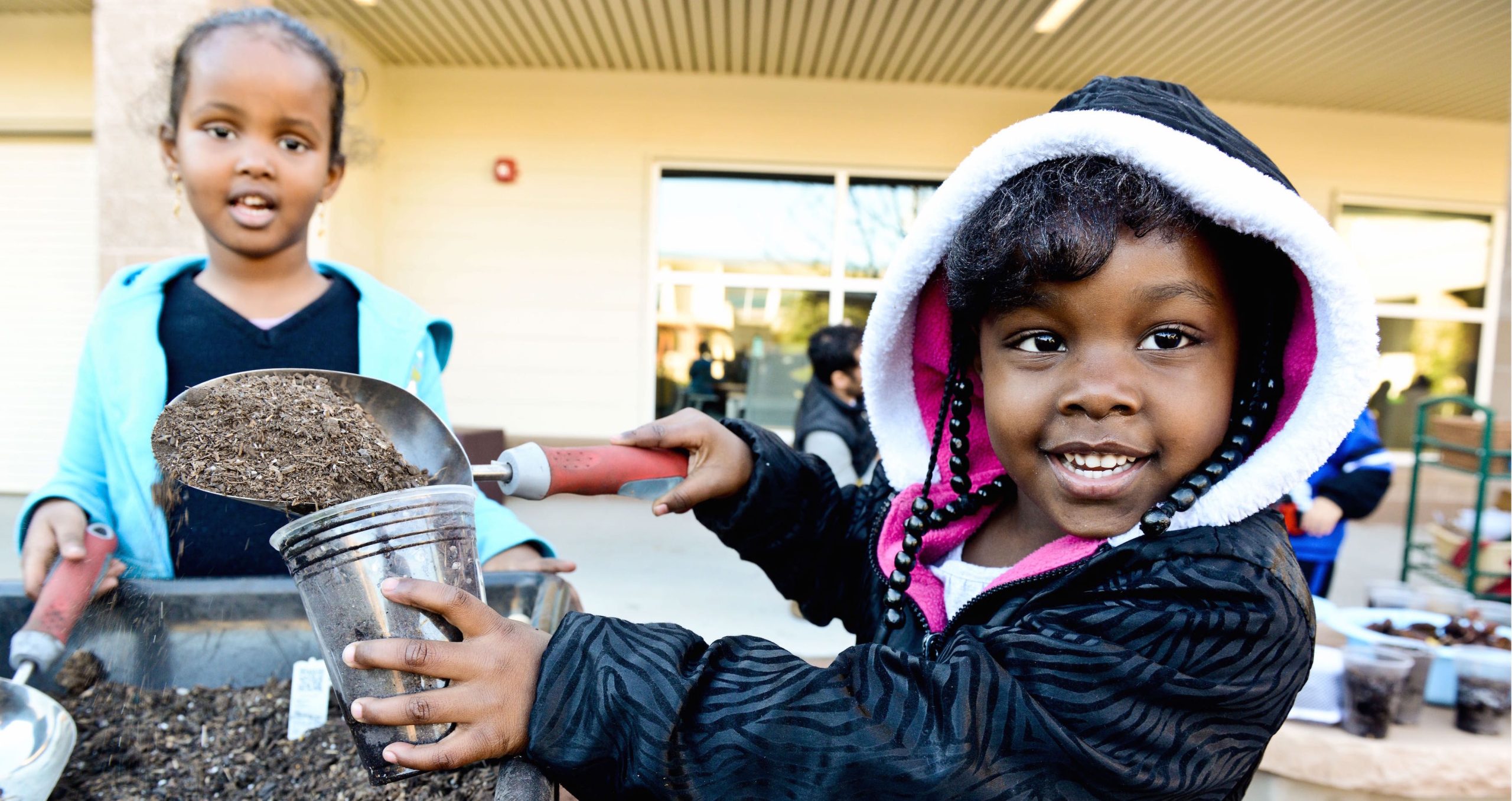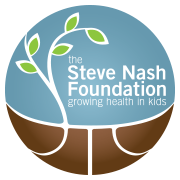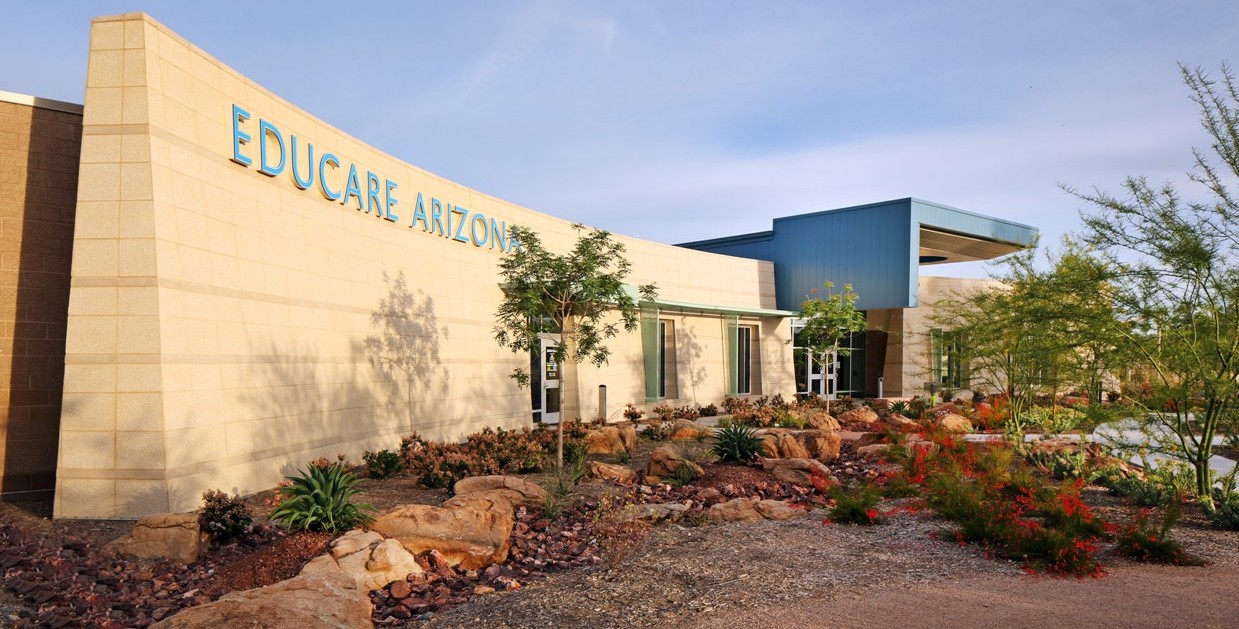
Educare
Partnership. Place. Program. Platform.
In 2006, then-Governor Janet Napolitano reached out to a fellow Santa Clara University alum about championing early childhood education as a means towards economic development in Arizona.  She had been contacted by the Buffett Early Childhood Fund and the Ounce of Prevention (now Start Early), who had teamed on a platform called Educare: a national network of highest quality early learning centers combining the best of Early Head Start, Head Start, childcare, preschool and family support to help low-income children ages birth to five grow up eager, healthy, and ready for school.  Educare aims to take the most cutting-edge early childhood research and neuroscience from the lab to the classroom.  More than just exceptional preschools, Educare schools are the catalysts for change that spark local and national public policy, discourse about the importance of investing in young children, and critical improvements in quality.
On September 6, 2011, Educare Arizona joined the nation‚Äôs leading partnership for early learning as the thirteenth Educare Learning Network school to open in the country.¬† Bringing together a public-private collaboration to assist underserved children ages birth to five, Educare Arizona represents investment in our community, our economy, and our future.¬† A founding collaborator and anchor funder in Educare Arizona, the Steve Nash Foundation has now contributed more than $2million to Educare’s capital campaign, annual operations and national dialogue on early learning, and continues to serve on the Board of Directors.
Learn more at educarearizona.org.
The Place.
The thoughtfully designed building supports the programming excellence within and communicate lessons learned statewide: it sends a message to families, policy makers, business leaders and others that children in poverty have value, and are worthy of our investment.
The attached The Mountain Park Health Center Balsz Pediatric Clinic provides pediatric, dental, WIC, and social-emotional healthcare to Educare’s, and neighborhood, families, and has served as a clinical practicum site for student nurses, nurse practitioners, dentists and dental hygienists, and both allopathic and naturopathic medical students.
Given Arizona’s unique climate, the building was designed for and received LEED Silver certification, maximizing efficiencies and reducing environmental impact.
The Program.
Renown for its programmatic excellence, Southwest Human Development assists Educare Arizona in serving up to 191 children.  While the majority of Educare’s early learners are low-income, Educare Arizona welcomes a small percentage of higher-income children in recognition of research proving the benefits of socio-economic diversity in classrooms. Parents are expected to play an active role in governance, as they receive support in balancing demands of school or work with those of parenting, and one-third of space in the center Рof the operating budget Рis devoted to the needs of parents.  Services range from parental advocacy assistance to family support and referral.
Educare Arizona also fosters teacher training, providing a heightened expectation of quality in Educare teachers, and continuing professional development for all Educare Arizona teachers.  Moreover, Educare stands as a statewide hub for professional development, providing the resources needed to most efficaciously impact education around Arizona.
The following core objectives inform each day, all planning, and every interaction at Educare Arizona:
- reaching prenatal families as early as possible;
- developing stable and supportive relationships between children, families, and staff;
- promoting social, emotional, physical, language, arts, and early literacy and numeracy development;
- maintaining high standards for staff education levels and implementing reflective supervision and practice;
- providing immediate and ongoing child outcome assessment data as a means to affording individualized instruction and continuous programmatic improvements;
- and participating in state and national efforts to increase public support for the first five years.

Educare builds on families’ strengths, employing a child- and family-focused approach based on the understanding that children thrive with a consistent support system.
To do that:
- families are involved in program planning and decision-making;
- family support staff are degreed in their area of practice, and hold small caseloads to afford more individualized care;
- low teacher-student ratios are maintained in every classroom;
- master teachers with advanced education degrees in early childhood and infancy provide on-site supervision & training;
- Educare practices ‚Äúcontinuity of care‚ÄĚ to minimize transitions – children remain with the same peer group and caregivers for successive years, transitioning from infant & toddler classrooms to preschool classrooms at age three. ¬†This consistency helps children develop the secure, predictable relationships necessary for healthy social-emotional, and cognitive development;
- longitudinal assessments and child outcome tracking (social-emotional development, early language & literacy skills) are conducted in cooperation with Frank Porter Graham Child Development Institute (University of North Carolina)‚Äės national evaluation of the Bounce network and, locally, with ASU.
The Platform.

Educare Arizona’s impact extends beyond the walls of the school, providing a catalyst for change that assists in bridging the gap between what we know and what we do in early education.
Educare Arizona is showroom to demonstrate to legislators, business leaders, philanthropists, policymakers and other dignitaries and parents what high quality, well-implemented care can do for low-income children and their families.
Educare Arizona serves as a community of learning, where future teachers and healthcare providers benefit from best practices, current practitioners hone their skills, and neighbors come together to celebrate their strengths and cultures, and work together to ameliorate conditions for and learning environments of Arizona’s children.
To support Educare Arizona’s high-quality services, multiple funding streams Рa dynamic public-private partnership Рare leveraged in innovate and effective ways, underscoring the importance of early education throughout our community.
Educare Changes Lives: The Results Are In.
Educare levels the playing field.  Independent evaluation conducted by the University of North Carolina  shows at-risk children who enroll in Educare between birth and two years of age enter kindergarten on par with all children, regardless of income, entering kindergarten across the country.  While we know evidence of the achievement gap shows as early as 18 months of age, Educare prevents the achievement gap from taking root in the first five years.
Educare children score better on vocabulary and social skills than most low-income children.  Well-developed social skills are critical to school success.  Vocabulary is a strong predictor of how well a child will perform in school.
Educare is a nationwide network of schools.  Twenty-five Educare schools Рincluding one in the nation’s capital Рworking cooperatively with strategic advocacy groups advancing state and national policy make for a powerful voice heard in Washington and across the country.
Educare makes a lasting impact.  Educare of Chicago is the oldest school in the coast-to-coast network Рand the first to begin formally following children’s performance into elementary school.  This longitudinal follow-up study is still in the early stages, but its findings are full of promise:
- no ‚Äúfade out‚ÄĚ of skills at 3rd grade;
- a solid majority of Educare children get A’s and B’s in reading, math and science in 1st, 2nd, and 3rd grades Рoutperforming a comparison sample of Chicago Public Schools (CPS) students who did not attend Educare;
- significantly fewer Educare children are placed in special education or held back as compared to the CPS comparison students in the same schools and classrooms.  Research shows that even being retained one time in elementary school can mean a student is 30-50% more likely to drop out before finishing high school;
- a solid majority of Educare parents remain involved in their child’s learning.  About half of Educare graduates attend higher performing schools like magnet, charter and gifted schools.

